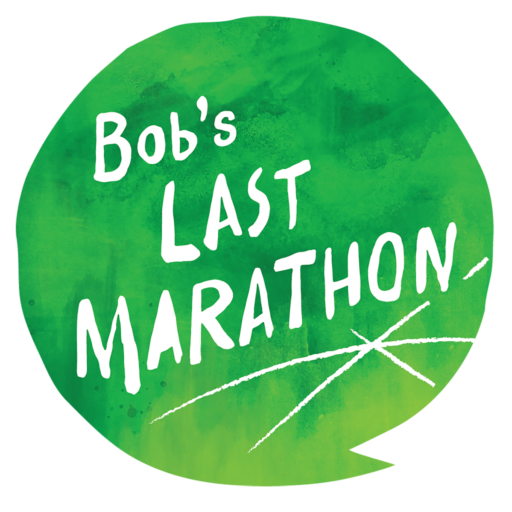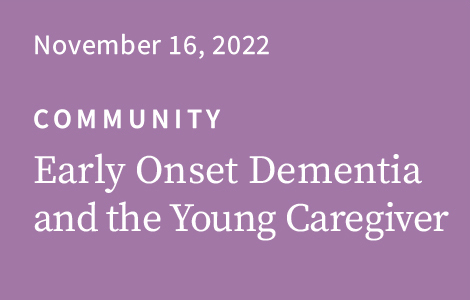Transcript
Young Caregiver
Mike and I were both 29 when we sat in an exam room at Boston’s Beth Israel Deaconess Medical Center. Dr. Galaburda, Chief of Cognitive Neurology at the time, listened patiently to my list of concerns and reviewed all of Mike’s medical records from the year before. He asked Mike to list all the words he could think of that began with the letter “F.” Mike could only think of one. It was one that I didn’t want Mike to repeat in front of our almost one-year-old son. When neither Dr. Galaburda nor I joined Mike in his laughter, he abruptly ended the test, standing up and announcing his need for a toilet. Once we were alone, Dr. Galaburda turned to me and said, “It is very bad.”
Dr. Galaburda was the eighth medical professional to see Mike and the first to diagnose him correctly with behavioral variant frontotemporal degeneration. Frontotemporal degeneration, also known as FTD, is an umbrella term that refers to a group of brain disorders that impact the frontal or temporal lobes of the brain. Each disorder is identified by the symptoms that appear first and most prominently. Primary progressive aphasia creates changes in the ability to speak and understand language. Corticobasal syndrome and progressive supranuclear palsy impact movement. And, as in Mike’s case, behavioral variant FTD creates behavioral symptoms such as apathy, loss of empathy, impulsivity, and problems with executive functioning. These disorders are progressive in nature, causing dementia and often striking people in their 40s or 50s. FTD is known as the most common young-onset dementia, a dementia diagnosed under the age of 65. Through education about FTD, I understood that Mike’s diagnosis at the age of 29 was incredibly early, making him unique, even within this rare disease community.
The appointment that day was just for Mike, but a dual diagnosis was given: one of “patient” for him and one of “caregiver” for me. It was a time in my life when I was leaning into new motherhood, planning my son Noah’s first birthday party, and imagining what it would be like to see him take his first steps. I had never heard of FTD, and I didn’t know that young people could be diagnosed with dementia. Memories of visiting my grandfather at his nursing home flooded my mind as Dr. Galaburda’s words washed over me. I felt unprepared to swim, drowning in this new and terrible information. Before I walked out of the clinic that day, Dr. Galaburda handed me a lifeline. It was a single piece of paper with a name and email address written at the top. Underneath, he had written “FTD Support Group.”
Looking back, that referral to the support group was the most powerful prescription we ever received in our journey with dementia. In the space of the support group, my questions were normal, and I received practical information about resources for care and strategies to manage the challenging behavioral symptoms of dementia. It was especially critical because, as a young-onset caregiver, I lacked connection with peers who had traveled the journey before me. I could call any number of girlfriends to talk about potty training or the best local playgrounds. A skilled nursing facility with a five-star rating? No chance.
The support group gave me the new tribe that I desperately needed, alleviating my fears that I was the only one living life with this unusual and unexpected diagnosis. In addition to emotional support, I learned practical information that empowered me as an advocate and increased my self-confidence as a caregiver. I realized there was a larger community dedicated to understanding young-onset dementia and increasing access for care and support. I learned that in 2018, the National Institute on Aging funded the Longitudinal Early-Onset Alzheimer’s Disease Study, or LEADS, to explore the development of young-onset Alzheimer’s disease and how it compares to the more common late-onset Alzheimer’s variant. And, in 2020, Congress included key provisions of the Younger-Onset Alzheimer’s Disease Act to reauthorize the Older Americans Act, ensuring that individuals of any age with Alzheimer’s disease and related dementias are now able to receive services and caregiver respite support through their local Area Agency on Aging. Our community wasn’t invisible.
Despite this wonderful connection for support, to meet my family’s high care needs, I made the decision to leave my professional job. With both Mike and me out of work, this meant a significant shift in our family’s income. FTD and early-onset Alzheimer’s disease are both recognized on the Social Security Administration’s List of Compassionate Allowances, meaning that applications from individuals with those diagnoses will be fast-tracked for approval for Social Security disability. This gave me assurance of a small stream of income, allowing me to build a new household budget. I signed us up for Medicaid to provide health insurance and, later, long-term care insurance coverage for Mike’s stay in a skilled nursing facility. We benefited from the federal Supplemental Nutrition Assistance Program, or SNAP, for food assistance, and I was even able to apply for a reduced fee at our local YMCA, where Noah learned to swim and enjoyed the child care room while I took a yoga class each week. Layering resources from multiple agencies required time and research, ultimately creating a social safety net that helped us stay afloat until I was ready to return to work.
The cost of dementia care is often one of the biggest stressors for families, and it can be exacerbated for individuals living with a young-onset diagnosis because their loved ones are more likely to be working full time, requiring more paid help. Expert guidance from a certified elder law attorney is best suited for identifying local and federal aid programs, as well as legal and financial planning after a diagnosis of dementia, regardless of the age of onset. As soon as possible, seek an attorney with experience helping families navigate the journey of young-onset dementia by contacting your state’s chapter of the National Academy of Elder Law Attorneys. Ask for help connecting with an attorney who has worked with individuals with a dementia diagnosis under the age of 65. By working with an expert, you can make a plan that maximizes your assets, local resources, and goals of care.
April 19, 2022, was the tenth anniversary of Mike’s passing. I know that our experience with young-onset dementia was made easier by the network of expert clinicians, seasoned professionals, and veteran caregivers. With layers of individual counseling, supportive friends, and family grief support through hospice, I built a path that led to a new present.
Earlier in 2022, I had heard of the Goosefields Windphone, a refurbished phone booth that had been set up as a “grief phone” on a beautiful farm in Portsmouth, Rhode Island. The Goosefields Instagram welcomed people to come and visit the booth if they had “words to send on the wind.” Exactly what I needed. When I arrived at Goosefields, I parked at the top of the driveway, wanting to walk a bit in the field, lifting my face to the wind, feeling the spring sunshine splash across familiar tears. I stepped into the phone booth, hearing the whoosh of the folding door as it closed tightly behind me. As I lifted the bright red receiver of the antique phone, a burst of wind rattled the walls of the booth. I didn’t feel afraid. I thought about all the things I would want to tell Mike. I could talk about the new home I purchased myself. Or gush about how, at the age of 14, Noah was already six feet tall. That I hoped he was proud of us. I imagined my words floating on the wind, a strong force able to bear the heavy burden of grief and the weight of love, jumping time, traveling to wherever they needed to land.
Katie Brandt
Director of Caregiver Support Services and Public Relations
Massachusetts General Hospital Frontotemporal Disorders Unit

